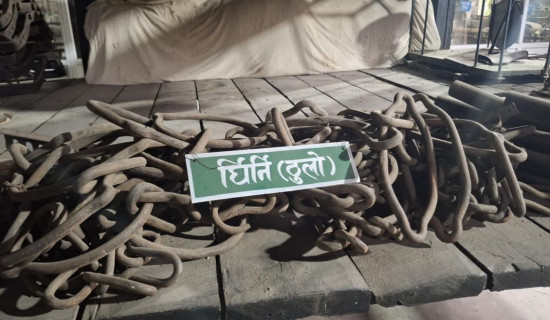- Saturday, 21 June 2025
Kamalakhunj locals living with terror of wild elephants
By Baburam Devkota,Sindhulimadhi, Apr. 12: Kamalakhunj area, a Chure region in Sindhuli district, was earlier the path for wild elephants. With development, settlements started being set up along the path, and now, the locals are in regular conflicts with the elephants that travel through their traditional route.
According to the district’s Division Forest Office, Kamalakhunj area covers wards 1, 2, 3, 4, 5, 6, 7, 8, 9, 10 and 11 of Dudhauli Municipality and wards 9, 13 and 14 of Kamalamai Municipality.
Herds of wild elephants from Parsa National Park and Koshi Tappu Wildlife Reserve roam the area two-three times a year. When they arrive, they cause damages to the settlements on their way.
“The gorge of Chure region is the corridor for wild elephants residing in the two protected areas. The elephants use the path at least once a year. When they arrive, devastation is certain,” said Krishna Raj Neupane, chief of the forest office.
According to Neupane, during monsoon (June-July), elephants from as far as Jhapa district in the east use this path to travel towards the west. “From January to March, it is the mating season for elephants. After it, the elephants return east,” said Neupane.
While travelling through their traditional route, elephants are likely to destroy anything that obstructs their movements. “We have created obstacles along their route. The only way we can avoid their destruction is to allow them to pass without any obstruction,” said Neupane.
Meanwhile, damages have always been unbearable for the locals because Kamalakhunj area is the store room of crops for Sindhuli district. It is because the elephants not only destroy houses but also eat the stored crops and food.
Local farmers get happy to see large yield in the arable land spread from the Madan Bhandari Highway to the gorge of the Kamala River near the Chure; however, when elephants arrive, happiness turns into sadness.
Eight dead, hundreds of families affected
In the past 13 years, eight individuals were killed in elephant attack in the area. The latest death was reported on February 25 this year.
Most of the deaths were reported in 2009 as five people were killed in the year. Since then, one death each has been reported in 2011, 2019, 2020 and 2023 respectively. Officials informed that the elephants destroyed houses and crops of 160 families in the past two years alone.
Last year, 130 families had suffered losses as their houses and crops were destroyed. This year, 30 families have already suffered.
“We mostly have houses made of bamboo and mud. Even a child elephant can break them. When the herds of elephants arrive, they leave nothing in the field and in our houses,” said Dambar Bahadur Pariyar, an elephant victim from Ward No. 11 of Dudhauli.
According to Pariyar, his house, which was made from bamboo, was destroyed and around 400-kilogram paddy was eaten this year.
Compensation to victims
According to the Division Forest Office, families of seven of the eight deceased have received compensation as per the prevailing law till date. The compensation has not been provided to the family of the latest victim. The officials said that the process to provide compensation to the family of 40-year-old Dandapani Paudel was underway.
The deceased’s families received Rs. 150,000 in 2009. The compensation has been raised now, and the families of victims after 2019 and 2020 received Rs. 1 million each. The compensation was provided through the Parsa National Park. However, the prevailing laws have no provision regarding compensation for houses and crops destroyed by the animals.
The Parsa National Park has forwarded files of 145 families in the past two years to the higher authorities for compensation of crops and houses destroyed. “We have not received any compensation for those damages yet,” said Neupane. According to Neupane, he has contacted the director general at the Department of National Parks and Wildlife Conservation. “In return, I feel assured that the compensation will be forwarded soon,” said Neupane. According to Dudhauli’s Deputy Mayor Chandra Kishore Tharu, support for the victims who lost their houses and properties have been provided through them and helping hands.
“We provide up to Rs. 10,000 per family under the local disaster management fund because we do not have enough fund. The district’s Red Cross office provide food, tarpaulin and utensils,” said Tharu.
Way forward
The locals informed that they had no plans to vacate the area. However, they could also not sleep in peace at night due to fear of elephants. Moreover, they could not tolerate any more damages as the government does not provide compensation in return for the losses, unless it is human casualty. “We have no other option but to stay awake and chase the elephants. This seems to be the only way forward as we are left hopeless,” said Pariyar, an elephant victim.
Locals also said that the authorities played no effective roles in helping them chase away the elephants. They either form small groups and use fire to chase the elephants or make noise by hitting steel utensils. “We request the forest office, municipality and police for help to chase the elephants but to no avail. At the end, it is up to us. It seems the devastation will be a new normal for the rest of our lives,” said Pawan Karki, ward chairman of Ward No. 11, Dudhauli.













-original-thumb.jpg)


